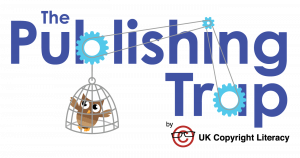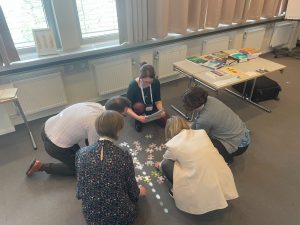Using games to engage with Open Access (and beyond!)
By Kirsty, on 18 May 2022
Guest post by Petra Zahnhausen-Stuber, Open Access Team, UCL Library (LCCOS)
In recent years, ‘Gamification’, the use of game elements in non-gaming settings to improve user experience, has been embraced by Research Support Services at Higher Education Institutes. Research Support Games cover various topics including research data management, copyright and/or open access and address an audience ranging from early career researchers and academics to support staff.
For the organisers of the Research Support Games Days (RSGD), games can be an effective tool to communicate with scholars about often complex concepts. In its third instalment since 2019, this event promotes the use of game-based learning among Research Support Services by presenting games, online tools and platforms that could be beneficial for training purposes. Here it was also highlighted, that most of these games were designed to be played in person. However, the outbreak of the Covid-19 pandemic in 2020 was a catalyst for developing more virtual games as a way of continuing the engagement with researchers when face-to-face training was not possible. Despite any the challenges of creating digital games, their advantage of reaching a wider audience outside the physical environment of research institutions becomes apparent in the following examples of Open Access themed online games.
 The Publishing Trap (UK Copyright Literacy), this game about scholarly communication focuses on helping researchers understand the effect of different publishing models, copyright and finances on the dissemination of their research. First launched as a board game in 2017, in response to the pandemic a digital version was created in 2020. In both versions participants form up to 4 teams representing four scholars in different career scenarios and make decisions about how to best publish their research. Retaining most of the original features, the online version uses interactive PowerPoint slides and can be played via any virtual classroom software with a break-out room functionality, so that the element of team discussions from the board game is being replicated.
The Publishing Trap (UK Copyright Literacy), this game about scholarly communication focuses on helping researchers understand the effect of different publishing models, copyright and finances on the dissemination of their research. First launched as a board game in 2017, in response to the pandemic a digital version was created in 2020. In both versions participants form up to 4 teams representing four scholars in different career scenarios and make decisions about how to best publish their research. Retaining most of the original features, the online version uses interactive PowerPoint slides and can be played via any virtual classroom software with a break-out room functionality, so that the element of team discussions from the board game is being replicated.
Similarly, in 2020, the role-playing Open Access Mystery game developed by Katrine Sundsbo uses downloadable slides. It was also designed for online platforms (i.e. Zoom) to allow for immediate verbal interaction between players who are tasked with finding the culprit responsible for a global lockdown of all research. The Open Access Escape Room, also by the same author, was originally created in 2018 as a physical game and digitally adapted in 2020 under the name The Puzzling Hunt for Open Access. Both versions follow the narrative of all research being locked away by a villain and are aimed at academic staff to gain an understanding of the concepts of Open Access. The players have to find clues and solve various Open Access themed puzzles in order to unlock research. Despite not replicating the original escape room format, where participants interact with each other in teams, the online game offers more flexibility as the mixed media-based puzzles can be completed by a single player at their own pace. Like most Research Support Games, all materials are published under a CC BY licence resulting in both versions having been played and adapted further in and outside the UK.
The single-player Open Axis: The Open Access Video Game (UCLA) was always designed for a remote learning environment intending to reach a worldwide audience of graduates and undergraduates. Created in 2020, this “choose your own adventure” can be played in a web browser, is predominantly text based but features classic 8-bit video games. The player chooses between several characters portraying scholars of various backgrounds. Following a non-linear narrative, the player’s decision impact the course of the in-game stories around themes of open access, scholarly publishing and research practices.
Choosing another approach of getting scholars interested in Open Access, the team at Robert Gordon University developed five online puzzles in 2021, including memory, crosswords and a scavenger hunt. Since puzzles can be played quicker than games, it makes them suitable for bite-sized learning during icebreakers or coffee breaks.
These games form by no means an exhaustive list and it is worth delving into the manifold resources of the Research Support Games Day Proceedings (below), where the benefits and challenges involved in taking games online are further explored.
For more information on Research Support Games Days and Gamification:
- Research Support Games Day – Notes (2019)
- Proceedings of the 2nd Research Support Games Day (RSGD #2)
- Proceedings of the 3rd Research Support Games Day (RSGD #3)
- Sebastian Deterding, Miguel Sicart, Lennart Nacke, Kenton O’Hara, and Dan Dixon. 2011. Gamification using game-design elements in non-gaming contexts. In CHI ’11 Extended Abstracts on Human Factors in Computing Systems (CHI EA ’11). Association for Computing Machinery, New York, NY, USA, 2425–2428. 10.1145/1979742.1979575
Adaptions of the “Open Access Escape Room”:
 Close
Close





